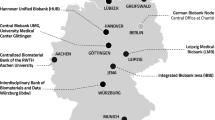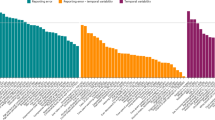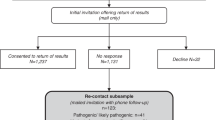Abstract
Stored tissue samples are an important resource for epidemiological genetic research. Genetic research on biological material from minors can yield valuable information on the development and genesis of early-onset genetic disorders and the early interaction of environmental and genetic factors. The use of such tissue raises some specific ethical and governance questions, which are not completely covered by the discussion on biological materials from adults. We have retrieved 29 guidelines and position papers pertaining to the storage and use of biological tissue samples for genetic research, originating from 27 different organizations. Five documents have an international scope, three have an European scope and 21 have a national scope. We discovered that 11 of these documents did not contain a section on biological materials from minors. The content of the remaining 18 documents was categorized according to four themes: consent, principles of non-therapeutic research on vulnerable populations, ethics committee approval and difference between anonymous and identifiable samples. We found out that these themes are not consistently mentioned by each document, but that documents discussing the same themes were mostly in agreement with their recommendations. However, a systematic reflection on the ethical and policy issues arising from the participation of minors in biobank research is missing.
Similar content being viewed by others
Log in or create a free account to read this content
Gain free access to this article, as well as selected content from this journal and more on nature.com
or
References
Ollier W, Sprosen T, Peakman T : UK Biobank: from concept to reality. Pharmacogenomics 2005; 6: 639–646.
Klotz J, Bryant P, Wilcox HB, Dillon M, Wolf B, Fagliano J : Population-based retrieval of newborn dried blood spots for researching paediatric cancer susceptibility genes. Pediatr Perinat Epidemiol 2006; 20: 449–452.
Rasmussen SA, Lammer EJ, Shaw GM et al: Integration of DNA sample collection into a multi-site birth defects case-control study. Teratology 2002; 66: 177–184.
Pembrey M : The Avon Longitudinal Study of Parents and Children (ALSPAC): a resource for genetic epidemiology. Eur J Endocrinol 2004; 151 (Suppl 3): 125–129.
Chadwick R, Berg K : Solidarity and equity: new ethical frameworks for genetic databases. Nat Rev Genet 2001; 2: 318–321.
Charo AR : Body of research – ownership and use of human tissue. N Eng J Med 2006; 355: 1517–1519.
Clayton EW : Informed consent and biobanks. J Law Med Ethics 2005; 33: 15–21.
Deschênes M, Glass KC, Cardinal G, Knoppers BM : Human genetic research, DNA banking and consent: a question of ‘form’? Clin Genet 2001; 59: 221–239.
Eriksson S, Helgesson G : Potential harms, anonymization, and the right to withdraw consent to biobank research. Eur J Hum Genet 2005; 13: 1071–1076.
Godard B, Aymé S, Schmidtke J, Cassiman J-J : Data storage and DNA banking for biomedical research: informed consent, confidentiality, quality issues, ownership, return of benefits. A professional perspective. Eur J Hum Genet 2003; 11 (Suppl 2): 88–122.
Knoppers BM : Biobanking: international norms 10. J Law Med Ethics 2005; 33: 7–14.
Petersen A : ‘Biobanks’ ‘engagements’: engendering trust or engineering consent? Genomics Soc Policy 2007; 3: 31–43.
Roche PA, Annas GJ : DNA testing, banking, and genetic privacy. N Eng J Med 2006; 355: 545–546.
Williams G, Schroeder D : Human genetic banking: altruism, benefit and consent. New Genet Soc 2004; 23: 89–103.
Borry P, Nys H, Goffin T, Dierickx K : Genetic testing and counselling. European Guidance. European Ethical-Legal Papers no. 3, 2007.
Fuchs M : National Ethics Councils: Their Backgrounds, Functions and Modes of Operation Compared. Berlin: German National Ethics Council, 2005.
Gezondheidsraad: Commissie Lichaamsmateriaalvoor bijzondere doeleinden: Naar goed gebruik. Lichaamsmateriaal in de gezondheidszorg 1994.
Nuffield Council on Bioethics: Human Tissue, Ethical and Legal Issues 1995.
HUGO Ethics Committee: HUGO Ethics Committee: Statement on DNA Sampling: Control and Access 1998.
American Medical Association: E-2.07 Clinical Investigation 1998.
National Bioethics Commission: Recommendation on Banks of Biological Material of Human Origin (Biobanks) in Biomedical Research 2006.
National Health and Medical Research Council: Guidelines for Genetic Registers and Associated Genetic Material 2000.
Visindasidanefnd: Biological Samples 2000.
ESHG: Data storage and DNA banking for biomedical research: technical, social and ethical issues. Eur J Hum Genet 2001; 11 (S2): S8–S10.
Medical Research Council: Human Tissue and Biological Samples for Use in Research – Operational and Ethical Guidelines 2001.
The Sub-Committee on Medical Research Ethics (TUKIJA) of the National Advisory Board on Health Care Ethics: DNA Samples in Epidemiological Research 2002.
Council for International Organizations of Medical Science (CIOMS): International Ethical Guidelines for Biomedical Research Involving Human Subjects 2002.
HUGO Ethics Committee: HUGO Ethics Committee: Statement on Human Genomic Databases 2002.
Bioethics Advisory Committee of the Israel Academy of Sciences and Humanities: Population-Based Large-Scale Collections of DNA Samples and Databases of Genetic Information 2002.
Bioethics Advisory Committee Singapore: Human Tissue Research 2002.
Human Genetics Commission: Inside Information 2002.
American Medical Association: E-2.079. Safeguards in the Use of DNA Databanks in Genomic Research 2002.
Commission de l'éthique de la science et de la technologie: Les enjeux éthiques des banques d′information génétique: pour un encadrement démocratique et responsible 2003.
Comité consultatif national d′éthique pour les sciences de la vie et de la santé: Avis n77 Problèmes éthiques posés par les collections de materiel biologiqueet les données d′information associées: ‘biobanques’ ‘biotheques’ 2003.
UNESCO: International Declaration on Human Genetic Data 2003.
World Health Organization: Genetic Databases. Assessing the Benefits and the Impacts on Human & Patient Rights 2003.
Deutsche Gesellschaft für Humangenetik: DNA-banking and personenbezogene Daten in der biomedizinischen Forschung: Technische, soziale und ethische Frage 2004.
Nationaler Ethikrat: Biobanks for research 2004.
Irish Council for Bioethics: Human Biological Material: Recommendations for Collection, Use and Storage in Research 2005.
Council of Europe: Recommendation Rec(2006)4 of the Committee of Ministers to Member States on Research on Biological Materials of Human Origin 2006.
Swiss Academy of Medical Sciences: Biobanks: Obtainment, Preservation and Utilization of human Biological Material. Medical-Ethical Guidelines and Recommendations 2006.
Austrian Bioethics Commission: Biobanken für die medizinische Forschung 2007.
NuGO Working Group: European Nutrigenomics Organisation (NUGO) Bioethics Guidelines on Human Studies 2007.
National Cancer Institute: Best Practices of Biospecimen Resources 2007.
World Medical Association (WMA): Declaration of Helsinki. Ethical Principles for Medical Research Involving Human Subjects 1964.
Baumann TK : Proxy consent and a national DNA databank: an unethical and discriminatory combination. Iowa Law Rev 2001; 86: 667–701.
Ross LF : Ethical and policy issues in pediatric genetics. Am J Med Genet C Semin Med Genet 2008; 148C: 1–7.
Wendler D, Shah S : Should children decide whether they are enrolled in nonbeneficial research? Am J Bioeth 2003; 3: 1–7.
Ashcroft R, Goodenough T, Williamson E, Kent J : Children′s consent to research participation: social context and personal experience in validate fixed cutoff rules. Am J Bioeth 2003; 3: 16–18.
Holm S : Informed consent and the bio-banking of material from children. Genomics Soc Policy 2005; 1: 16–26.
Stultiëns L, Goffin T, Borry P, Dierickx K, Nys H : Minors and informed consent: a comparative approach. Eur J Health Law 2007; 14: 21–46.
Artizzu F : The informed consent aftermath of the genetic revolution. an Italian example of implementation. Med Health Care Philos 2008; 11: 181–190.
Hansson MG, Dillner J, Bartram CR, Carlson JA, Helgesson G : Should donors be allowed to give broad consent to future biobank research? Lancet Oncol 2006; 7: 266–269.
Williamson E, Goodenough T, Kent J, Ashcroft R : Children′s participation in genetic epidemiology; in Tutton R, Corrigan O (eds): Genetic Databases: Socio-Ethical Issues in the Collection and Use of DNA. London and New York, Routledge, 2004, pp 139–160.
Annas GJ : Privacy rules for DNA databanks. Protecting coded ‘future diaries’. J Am Med Assoc 1993; 270: 2346–2350.
Kaufman D, Geller G, LeRoy L, Murphy J, Scott J, Hudson K : Ethical implications of including children in a large biobank for genetic-epidemiologic research: a qualitative study of public opinion. Am J Med Genet C Semin Med Genet 2008; 148C: 31–39.
Therrell BL, Hannon WH, Pass KA et al: Guidelines for the retention, storage, and use of residual dried blood spot samples after newborn screening analysis: statement of the Council of Regional Networks for Genetic Services. Biochem Mol Med 1996; 57: 116–124.
Laberge C, Kharaboyan L, Avard D : Newborn screening, banking, and consent. GenEdit 2004; 2: 1–15.
Lysaught M, Milhollin L, Peirce R et al: A pilot test of DNA-based analysis using anonymized newborn screening cards in Iowa; in Stored Tissue Samples: Ethical Legal, and Public Policy Implications (eds): Iowa City: University of Iowa Press, 1998, pp 3–31.
Trouet C : Van Lichaam Naar Lichaamsmateriaal. Recht En Het Nader Gebruik Van Cellen En Weefsels. Antwerpen: Intersentia, 2003.
Acknowledgements
This work was supported by GeneBanC, an EU-FP6 supported STREP contract number 036751 and FWO Flanders, project number G029107.
Author information
Authors and Affiliations
Corresponding author
Rights and permissions
About this article
Cite this article
Hens, K., Nys, H., Cassiman, JJ. et al. Biological sample collections from minors for genetic research: a systematic review of guidelines and position papers. Eur J Hum Genet 17, 979–990 (2009). https://doi.org/10.1038/ejhg.2009.9
Published:
Issue date:
DOI: https://doi.org/10.1038/ejhg.2009.9
This article is cited by
-
Personalized assent for pediatric biobanks
BMC Medical Ethics (2016)
-
Regulating biobanking with children’s tissue: a legal analysis and the experts’ view
European Journal of Human Genetics (2016)
-
Consent procedures in pediatric biobanks
European Journal of Human Genetics (2015)
-
Clarifying assent in pediatric research
European Journal of Human Genetics (2014)
-
Developing a policy for paediatric biobanks: principles for good practice
European Journal of Human Genetics (2013)



